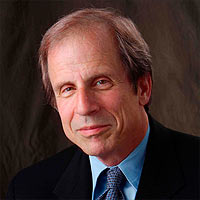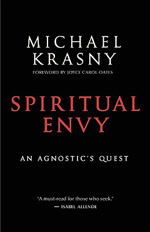Michael Krasny. Spiritual Envy: An Agnostic’s Quest. New World Library, 2010. ISBN: 9781577319122.
Michael Krasny is a professor of English at San Francisco State University, where he has taught since 1970. He is a widely published scholar and literary critic as well as a fiction writer. Krasny is the co-author of Sound Ideas (2009) and author of Off Mike: A Memoir of Talk Radio and Literary Life (2007) and Spiritual Envy: An Agnostic’s Quest (2010) . He is the host of the nation’s most listened to locally produced public radio show, Forum with Michael Krasny, which is a news and public affairs program that concentrates on the arts, culture, health, business, and technology. Krasny has interviewed many of the leading newsmakers and cultural icons of our time, including Saul Bellow, former President Jimmy Carter, Cesar Chavez, Noam Chomsky, Francis Crick, John Kenneth Galbraith, Newt Gingrich, Jane Goodall, V.S. Naipaul, Rosa Parks, Robert Redford, Salman Rushdie, Carl Sagan, Susan Sontag, Gloria Steinem, and Archbishop Desmond Tutu.
Spiritual Envy: An Agnostic’s Quest is a deeply personal story of Krasny’s spiritual life journey, which moves from a religious (Jewish) upbringing to a young adulthood marked by searching and uncertainty before arriving at well reasoned agnosticism. The book is marked by honesty, transparency, and a genuine openness to other perspectives and possibilities. While the breadth of sources is far beyond what one would expect in a book of this length, it serves effectively illustrate the scope of the author’s searching.
Ultimately, he cannot accept the certainty displayed by those on either side: the religious adherents about the existence of God or the atheists about the impossibility of the divine. In ordering his own life, Krasny continues searching while crafting, revising, and living by his own moral code.
So What?
In the introduction, Krasny writes:
Asking the right questions is at the heart of agnosticism, for it is essentially about uncertainty. . . Agnosticism is a position that denies the existence of absolutes and hidden spiritual forces behind the natural or material world until they can be empirically proven. Agnosticism welcomes proof, craves it, demands it. It does not say there is no God. It also does not say there is one . . . Agnosticism does not preclude spiritual hunger (p.6-7).
Would an agnostic feel welcome in her/his searching within the context of your local congregation? Why or why not?
Does your congregation place more value on asking questions or having answers? Which is a better fit for an agnostic in the context of a Christian community? Why?
How did you arrive at faith in God? What parts of your story before and/or after becoming a Christian are best characterized as times of searching? How has each such period helped strengthen your faith as you experience it today?

